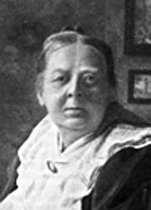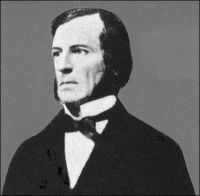
Mary Elizabeth (Everest) Boole (11 March 1832 – 17 May 1916) was a mathematician, author, reformer, and Spiritualist. She was the daughter of homeopath Thomas Roupell Everest and Mary Ryall (1809 – 1895). Her grandfather was Dr. Isaac Ryall (1777 – 1846) who partnered with fellow physicians Richard Grattan (1790 – 1886) & John Eustace (1791 – 1867) to found The Asylum and House of Recovery for Persons affected with Disorders of the Mind, later Hampstead Hospital, in Dublin.
Mary was a friend of Mary Fairfax Greig Somerville and was a correspondent of homeopathic supporter Charles Darwin.
When Mary was five, the family moved to Poissy (France) to visit Samuel Hahnemann, the founder of homeopathic medicine, as Thomas Roupell Everest was seriously ill and they were seeking a cure.
Mary became very close to her father during their time in France, and she even participated in his homeopathic treatment.
The first UK homeopaths were all close colleagues of Samuel Hahnemann. Frederick Hervey Foster Quin, William Leaf, Paul Francois Curie and Thomas Roupell Everest seem to have been part of an ‘inner sanctum’ of Samuel Hahnemann‘s protégés in Paris. This core of homeopaths were responsible for establishing homeopathy in the United Kingdom. They established practices in the UK and later free dispensaries for the poor and also several hospitals.
The family returned to England when Mary was eleven years after her father had recovered from his illness and he became a Reverend of a Church in Wickwar, at the foot of the Cotswold Hills.
Mary was removed from school and became an assistant to her father. Mary used books from her father to continue her studies in mathematics and she met the brilliant friends of her father, such as John Herschel and Charles Babbage.
Mary was devoted to tasks such as visiting the elderly, she gave classes in a school on Sundays and helped her father with his sermons. Through her uncle John Everest, a Professor of Classical Languages at the Queen’s College, Cork, and when she was eighteen years old, Mary met the now famous mathematician George Boole who was Professor of Mathematics at Queen’s College, Cork and who became her guardian.
Mary told how George Boole had difficulties with calculation and how the method of learning devised by Monsieur Déplacées (actually this is Pierre-Simon, Marquis de Laplace) had helped him. Mary shared a lot of time with George Boole both in leisure and in intellectual discussion.
After her return to England, Mary wrote to him and sent him some examples of her work in mathematics. George Boole moved to England two years later to train Mary in mathematical knowledge.
George Boole wrote An investigation of the laws of thought dedicated to John Ryall, the uncle of Mary, and she contributed significantly to the work. Mary’s father died in 1855 and George Boole supported her in these difficult moments. That’s when their romantic relationship was consolidated and within a year they were married.
Despite the fact that Mary was seventeen years younger than George Boole, they had a good and happy marriage. Over the next nine years, Mary and George had five daughters called Mary, Margaret, Alice, Lucy Everest Boole and Ethel. However, this happiness would soon fade. Tragically, George Boole contracted pneumonia and died in 1864, leaving Mary with five daughters and very little money. Nonetheless, Mary educated her daughters very well in mathematics and geometry, logic and thinking for themselves. Mary became friendly with James Hinton who introduced her to publisher Charles W. Daniel.
The following year, Mary accepted a job at Queen’s College, London. This was the first college of higher education for women throughout England, opened in 1847. During this time, neither women nor Jews could obtain university degrees or teach in college, so that although she loved teaching, Mary accepted a job as librarian. Through this employment Mary resolved the doubts of her students. Mary realized that she not only loved teaching but that she was good in this discipline.
In her later years Mary became friends with publisher Charles William Daniel, a principle organiser of the London Tolstoyan Society. Daniel published a magazine, “The Crank,” the name coined by Mary, who contributed a number of articles. She was part of a group of progressive literary and intellectual friends around Daniel who called themselves “The Cranks’ Table” and who regularly met at the Central Vegetarian Restaurant, 16 St. Bride Street, Ludgate Circus, in London.
Mary was a prolific author. Her first book, Lectures on the Logic of Arithmetic, published in 1883 but written in the 1860s, was a pioneering work in mental hygiene, while her 1904 book The Preparation of the Child for Science had a big impact on schools in England and the United States in the first part of the twentieth century.
For fifty years, Mary wrote a series of letters and articles that were published regularly until she died. Many of these were reissued in a collection published in 1931 by the Charles Daniel company, including Mathematics in Occultism, The Divining Rod, The Schoolgirl Medium (with Eleanor Meredith Cobham), About Girls, What One Might Say to a Schoolboy, Hooliganism, and Logic Taught by Love.
Mary remained an articulate voice on a range of topics, including anti-imperialism, and died in London in 1916, at the age of 84.
Select Publications:
- Lectures on the Logic of Arithmetic (1883)
- Symbolical Methods of Study (1884)
- Logic Taught by Love (1890)
- The Mathematical Psychology of Gratry and Boole (1897)
- The Preparation of the Unconscious Mind for Science (1899)
- The Cultivation of the Mathematical Imagination (1902)
- The Preparation of the Child for Science (1904)
- Miss Education and her Garden. A short summary of the educational blunders of half a century, etc. (1908)
- Mistletoe and Olive, An Introduction for Children to the Life of Revelation (1908)
- The Message of Psychic Science to the World (1908)
- Suggestions for Increasing Ethical Stability (1909)
- Philosophy & Fun of Algebra (1909)
- A Woodworker and Tentmaker (1909)
- The Forging of Passion Into Power (1910)
- Some Master-Keys of the Science of Notation, A Sequel to ‘Philosophy and Fun of Alegebra’ (1911)
- At the Foot of the Cotswolds (1923)
- Mary Everest Boole Collected Works (1931)
- A Boolean Anthology: Selected Writings of Mary Boole on Mathematical Education (1972)
Her friend Eleanor Meredith Cobham wrote Mary Everest Boole: A Memoir with Some Letters (1951)
Of Interest:
 George Boole (2 November 1815 – 8 December 1864) was a British mathematician and philosopher. As the inventor of Boolean algebra, which is the basis of all modern computer arithmetic, Boole is regarded in hindsight as one of the founders of the field of computer science.
George Boole (2 November 1815 – 8 December 1864) was a British mathematician and philosopher. As the inventor of Boolean algebra, which is the basis of all modern computer arithmetic, Boole is regarded in hindsight as one of the founders of the field of computer science.
George Boole was the husband of Mary Elizabeth Everest Boole, daughter of homeopath Thomas Roupell Everest.
The Booles had five daughters:
- Mary Ellen (7 June 1856 – 28 May 1908), who married the mathematician and author Charles Howard Hinton (1853 – 1907). They had three children, Howard, William and Joan.
- Margaret (1858 – 16 August 1935), whose son Geoffrey Ingram Taylor became a mathematician and a Fellow of the Royal Society
- Alicia (8 June 1860 – 17 December 1940), also a mathematician, who made important contributions to four-dimensional geometry
- Lucy Everest Boole, a chemist who, in 1888, was only the second woman to pass the London School of Pharmacy‘s major examination, and was the first woman to formally conduct research in pharmaceutical chemistry.
- Ethel Lilian (11 May 1864 – 27 July 1960), who married the Polish scientist and revolutionary Wilfrid Michael Voynich and was the author of the novel The Gadfly.


Leave A Comment